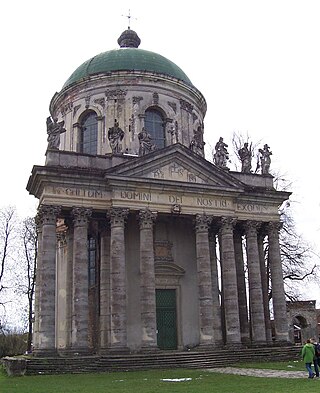Related Research Articles
An apostolic administration in the Catholic Church is administrated by a prelate appointed by the pope to serve as the ordinary for a specific area. Either the area is not yet a diocese, or is a diocese, archdiocese, eparchy or similar permanent ordinariate that either has no bishop or archbishop or, in very rare cases, has an incapacitated (arch)bishop. The title also applies to an outgoing (arch)bishop while awaiting for the date of assuming his new position.

The Diocese of Fairbanks is a Latin Church ecclesiastical territory, or diocese, of the Catholic Church in the northern part of the state of Alaska in the United States. It was formerly named the Prefecture Apostolic of Alaska (1894–1917) and the Vicariate Apostolic of Alaska (1917–1962).

The Archdiocese of Portland in Oregon is a Latin Church archdiocese of the Catholic Church in western Oregon in the United States.

The Diocese of Biloxi is a Latin Church ecclesiastical territory, or diocese, of the Catholic Church that encompasses 17 counties in southern Mississippi in the United States. The diocese was erected on March 1, 1977, when it was split from the Diocese of Jackson. The Diocese of Biloxi is a suffragan diocese of the ecclesiastical province of the metropolitan Archdiocese of Mobile, though for its first three years the diocese was in the province of the Archdiocese of New Orleans.

The Catholic Church in Iceland is part of the Catholic Church, under the spiritual leadership of the Pope. The island is served by a single diocese, the Diocese of Reykjavík, having a total of seven parishes. As of 2015, the ordinary is bishop Dávid Bartimej Tencer. The diocese is directly subject to the Holy See.

The Catholic Church in Tajikistan is part of the worldwide Catholic Church in Tajikistan, under the spiritual leadership of the Pope in Rome.

The Catholic Church in Moldova is part of the worldwide Catholic Church, under the spiritual leadership of the Pope in Rome.

The Catholic Church in Kazakhstan is part of the worldwide Catholic Church, under the spiritual leadership of the pope in Rome.

The Catholic Church in Nepal is part of the worldwide Catholic Church, under the spiritual leadership of the pope in Rome. As of 2011 there are over 10,000 Catholics in Nepal, organized into one Catholic jurisdiction known as an apostolic vicariate.

The Catholic Church in Pakistan is part of the worldwide Catholic Church, under the spiritual leadership of the pope in Rome.

Joseph Werth SJ is Bishop of Transfiguration in Novosibirsk (Russia).

Athanasius Schneider, O.R.C. is a Catholic prelate, serving as the Auxiliary Bishop of Astana in Kazakhstan. He is a member of the Canons Regular of the Holy Cross of Coimbra. He is known for championing the pre-Vatican II liturgical traditions and practices of the Church and for protesting certain current policies, including some associated with Pope Francis.

Christianity has a long history in Kyrgyzstan, with the earliest archaeological remains of churches belonging to the Church of the East in modern-day Suyab dating back to the 7th century. By the 9th century an archdiocese of the Church of the East cared for the Christians of Kyrgyzstan and adjacent areas in eastern Turkestan. Although primarily Turkic there was also an Armenian community in what today is Kyrgyzstan by the 14th century. By the 15th century, however, there were no longer ecclesiastical structures of any church caring for what is today Kyrgyzstan and Islam gained the ascendancy amongst the Kyrgyz people.

The Ukrainian Orthodox Greek Catholic Church (UOGCC) is an unregistered Eastern Independent Catholic religious movement that was established by Basilian priests, predominantly from Slovakia, who schismated from the Ukrainian Greek Catholic Church and declared the creation of the new church in 2009 based in Pidhirtsi, Ukraine.

The Roman Catholic Diocese of Karaganda is a Latin diocese of the Catholic Church, suffragan in the ecclesiastical province of the Metropolitan of Mary Most Holy in Astana, yet remains subject to the missionary Congregation for the Evangelization of Peoples.
Marian Oleś was a Polish prelate of the Catholic Church who worked in the diplomatic service of the Holy See and in the Roman Curia.

The Apostolic Administration of Kazakhstan and Central Asia is an Apostolic Administration and is exempt, i.e. directly subject to the Holy See, that extends its jurisdiction over all the Eastern Catholic faithful of the Byzantine Rite who live in Kazakhstan, Kyrgyzstan, Tajikistan, Turkmenistan and Uzbekistan.

Vasyl Hovera is a Ukrainian-born hierarch for Eastern Catholic Churches of the Byzantine Rite, who serves as an Apostolic Administrator of the Apostolic Administration of Kazakhstan and Central Asia for Faithful of Byzantine Rite, with a see in Karaganda, for Kazakhstan, Kyrgyzstan, Tajikistan, Turkmenistan and Uzbekistan since 1 June 2019.
The Catholic Bishops' Conference of Kazakhstan was the episcopal conference of Kazakhstan, that operated from 2003 until 2022. It consisted of Archdiocese, two dioceses, and apostolic administration.
References
- ↑ World Religions Database on the ARDA website, retrieved 2023-08-08
- 1 2 3 4 5 "Kyrgyzstan Catholic Camp Encourages Youths To Have Better Understanding Of Their Faith". Union of Catholic Asian News. 2008-09-03. Archived from the original on September 30, 2008. Retrieved 2008-11-20.
- ↑ Cheney, David M. "Kyrgyzstan (Apostolic Administration) [Catholic-Hierarchy]". www.catholic-hierarchy.org. Retrieved 2017-05-04.
- ↑ Catholics And Culture website, retrieved 2023-08-08
- ↑ Kokaisl, Petr; Kokaislová, Pavla (2009). The Kyrgyz – Children of Manas. Кыргыздар – Манастын балдары. Alterra. p. 290. ISBN 978-80-254-6365-9 . Retrieved 24 March 2024.
- 1 2 3 "Kyrgyzstan First Bishop Installed As Head Of Local Church". Union of Catholic Asian News. 2006-07-06. Archived from the original on January 6, 2009. Retrieved 2008-11-20.
- 1 2 "Kyrgyzstan". US Department of State. 2001-10-26. Retrieved 2008-11-20.
- 1 2 "Kyrgyzstan Local Church Exists Mainly As Small Communities". Union of Catholic Asian News. 2004-02-03. Archived from the original on January 6, 2009. Retrieved 2008-11-20.
- ↑ "Kyrgyzstan 'Boring' Work Vital For Building Church". Union of Catholic Asian News. 2003-11-04. Archived from the original on January 6, 2009. Retrieved 2008-11-20.